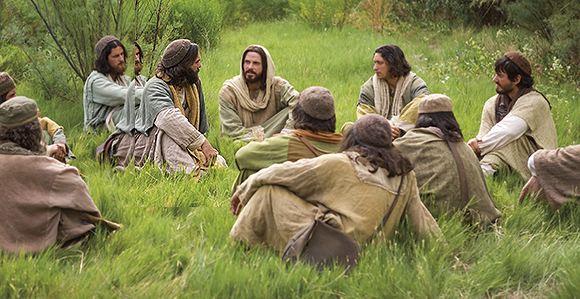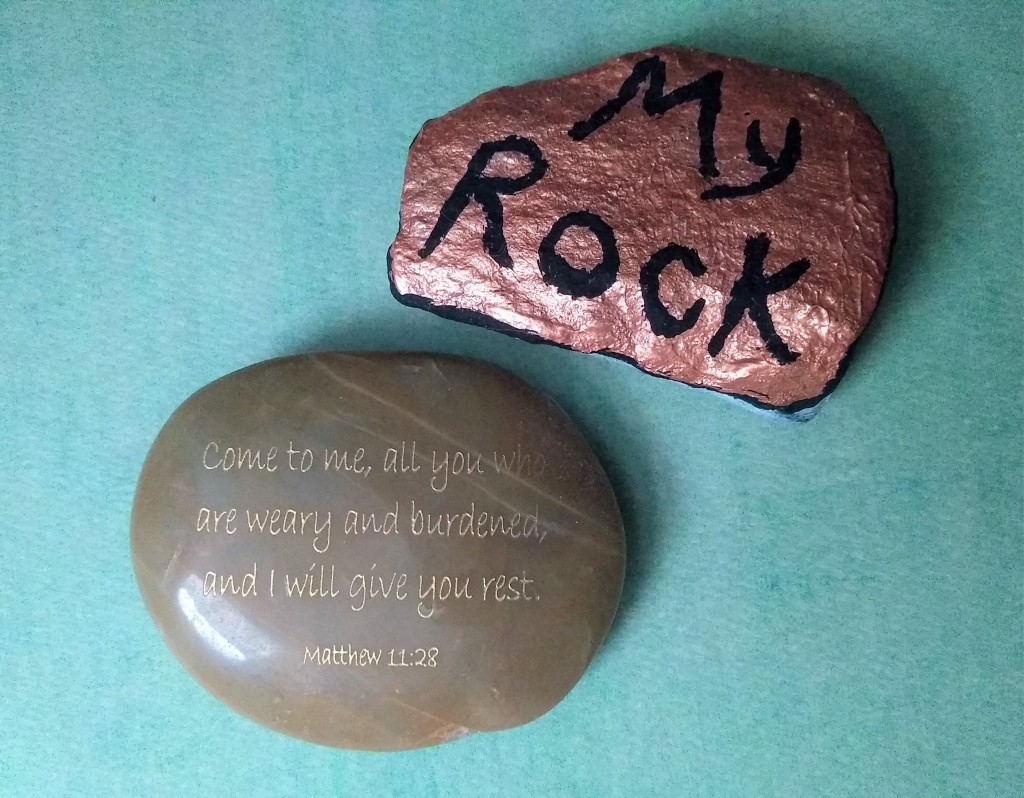“For we do not have a high priest who is unable to sympathize with our weaknesses, but we have one who has been tempted in every way, just as we are–yet was without sin. Let us then approach the throne of grace with confidence, so that we may receive mercy and find grace to help us in our time of need.” (Hebrews 4:15-16)
When I was a child going to Sunday school in the basement of my church they used “flannelgraphs” to tell Bible stories. A flannelgraph consisted of a flannel-covered board on an easel and cloth Bible characters. The characters stuck to the board as you placed them. Then you’d peel them off and place more characters while telling the story. There was Joseph and his brothers; Noah, the ark and the animals; and of course, Jesus. 
The stories I heard about Jesus in Sunday school always made him sound larger than life. He worked miracles healing people and made a little bit of food go around to feed a multitude. He was a pretty awesome Jesus.
Then I’d go upstairs to ‘big church’ and the pastor’s message about Jesus was that he died on a cross for me. That kept Jesus in the larger than life realm. Not knowing exactly what a crucifixion entailed, I assumed it was pretty bad and that I was lucky Jesus would do such a thing for me. The pastor talked about how angry God was about sin and how much I needed his forgiveness. He was a pretty awesome God too, but for different reasons. I made a decision to ask God to forgive me and said a prayer, asking Jesus to come into my heart.
God and Jesus fell into the larger-than-life category for a long time. And there’s nothing wrong with that; they are larger than life. But something was missing and it kept me from really knowing how much I could benefit from the decision I’d made about Jesus. I didn’t know it then, but what I was missing was Jesus with flesh on.
Skip ahead several years. I had become confused and disillusioned by church, leaving it to try my own way of living. I still believed in God, but he wasn’t part of my worldview. Then something happened to create in me a hunger for him and I returned to the church. Because I was hungry for God, I began to read my Bible. In fact, I devoured it. Guess what I found?
I found a Jesus with flesh on.
I don’t remember the folks in the church where I grew up talking about Jesus as a man. They must have, but I was young and mostly hearing the anger part. I never really got a glimpse of Jesus with flesh on until I read about him for myself. As I traveled through Galilee and the Judean countryside with him and his followers I watched him interact with people like a real person would. I saw him express emotions like anger, joy, and grief. 
He got tired and slept. He got hungry and ate. He interacted with friends and with some Pharisees (who weren’t always counted among the friendly). He worshiped on the Sabbath. He engaged in normal human activities found easily if you look in scripture.
Maybe it’s the storyteller in me that looks for what’s hidden. I look at more than just the words, and I read between the lines. For starters, he was a carpenter. Imagine Jesus banging his finger with a hammer and getting one of those black fingernails. We know he had sisters and brothers and, though we aren’t told much about his childhood, it must have been a fairly normal one with playtime, chores, and “school”.
Then his ministry began. Look at the loaves and fishes story. After Jesus multiplied the food for the crowds, he sent his disciples on to Bethsaida “while he dismissed the crowd.” (Mark 6:45) Call me goofy, but I see Jesus talking to people as they leave as if he knows them personally. It’s not a “Hey, all of you, clear out of here now” type of dismissal. It’s the type of thing a host would do, saying goodbye to as many as possible and seeing that their needs are met. Anyway, that’s the Jesus I was getting to know.
I got to know this Jesus who was a single man all his life while many his age would have been betrothed or already married. Jesus lost a relative, John the Baptist, to a cruel death and took time to grieve alone before he was called again to minister to the crowds. Jesus’ closest relatives misunderstood him to the point that they tried to manipulate his actions, thinking they knew better what he should do. At a crucial moment, his best friends deserted him. One of his friends took his own life.
After becoming familiar with this Jesus, I realized that I need the God who’s larger than life and truly awesome. But I also need this Jesus who has been human and can understand what it’s like to be me. Many of us have no mate, have grieved the loss of a close relative, are genuinely misunderstood, and have been deserted by a friend.
 “Since you are my rock and my fortress, for the sake of your name, lead and guide me.” Psalm 31:3
“Since you are my rock and my fortress, for the sake of your name, lead and guide me.” Psalm 31:3
Jesus with flesh on makes him able to relate to us in every problem and in every success. God wants to get up close and personal. He wants us to know he’s not just a flat personality we peel and stick to our circumstances when we need him. He’s a fleshed-out God who relates to every situation in which we find ourselves. And his desire is that we’ll get to know him as that pretty awesome Jesus.




 “Since you are my rock and my fortress, for the sake of your name, lead and guide me.” Psalm 31:3
“Since you are my rock and my fortress, for the sake of your name, lead and guide me.” Psalm 31:3
 In the story of the Israelites crossing the Red Sea, the people once again grumble, moan, and in effect blame Moses for the current predicament. When I’m up against a wall, as they were, I can easily begin to wonder—sometimes loudly—”What in the world is this all about? Weren’t things bad enough already? Now what?”
In the story of the Israelites crossing the Red Sea, the people once again grumble, moan, and in effect blame Moses for the current predicament. When I’m up against a wall, as they were, I can easily begin to wonder—sometimes loudly—”What in the world is this all about? Weren’t things bad enough already? Now what?” The Egyptians found them, but God knew they would. I mean, He’s God after all. He wanted His people to trust Him. It was a way for them to see Him. To watch Him do what He does best. To know Him even better. This is no less true for me.
The Egyptians found them, but God knew they would. I mean, He’s God after all. He wanted His people to trust Him. It was a way for them to see Him. To watch Him do what He does best. To know Him even better. This is no less true for me.



